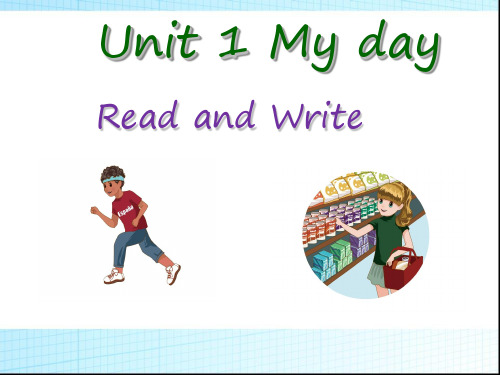英语五年级下册Unit1_My_day
人教PEP版英语五年级下册 Unit 1 My day 阅读理解同步提优训练

人教PEP版英语五年级下册 Unit 1 My day阅读理解同步提优训练阅读短文,选择正确的答案。
Chen Jie is very busy every day. She gets up early in the morning, because she has to play sports and read English. After breakfast, she rides her bike to school. She has four classes in the morning and three classes in the afternoon, At 6: 00 p. m. , she has to learn to play the piano. Then she goes home and eats dinner. She usually goes to bed at 10: 30 after finishing her homework. She feels very tired every day.1.Chen Jie is ________.()A.a teacher B.a doctor C.a student2.Chen Jie doesn't ______ before breakfast. ()A.watch TV B.play sports C.read English 3.Chen Jie goes to school ________. ()A.by bus B.by bike C.on foot4.Chen Jie has _____ classes in the morning. ()A.three B.four C.eight5.Chen Jie feels _______every day. ()A.tired B.interesting C.excited阅读理解,根据短文选择正确选项。
人教PEP版英语五年级下册Unit 1 My day Part A课件

Exercises
一、为下列短语选择正确的汉语翻译。 A.返回学校 B.在家 C.在西班牙 D.午饭后
( B ) 1. at home ( C ) 3. in Spain
( D ) 2. after lunch ( A ) 4. go back to school
Exercises
二、情景交际小能手。
Let's talk
知识点 3
usually
通常地;惯常地
用法:表示做事的频率,在句中放在实义动词的前面, 系动词和助动词之后,也可以放在句首。
选出错误的一项,并改正。
( B ) What do you do usually on the weekend?
A
B
C
__u_s_u_a_ll_y__d_o__
Let's talk
知识点 4
when 与 what time
when 和 what time都可以用来询问时间,意思是“什么时候”, 它们之间的区别如下:
当询问做某事的具体时间(几 --When / What time do you have dinner?
点钟)时,两者可以替换
--I have dinner at 6:00 p.m.
p.m.
Can you say
A: When do you _________________? B: At ___________.
ABCD EFGH
a.m.
Can you say
A: When do you _________________? B: At ___________.
p.m.
Let's talk When do you…?
Unit1Myday(课件)人教PEP版英语五年级下册

记到小本本上
He is oyoldu.ng.
What’s he like? He is funny.
What’s she like? She is kind.
What’s he like? He is strict.
一.单项选择。( ) 1. —Do you know Miss White? —Yes, I __________.
polite 有礼貌的;客气的
What are they like? They're helpful. helpful
有用的;愿意帮忙的
Look at the kids. Who's helpful?
√√
√
You're clever!
cleverTony is clever, too. But Lily is hard-working.
_k_in_d__.
The boy is eleven years old.
He is_y_o_u_n_g_. 知道;了解
Do you know him?
He's Oliver. He's Wu Yifan's new classmate.
What's the boy like?
He's polite.
翻译: 你认识我们的音乐老师吗? 是的,我认识。
--What is she like? -- She’s kind.
询问某人的体貌特征或性格特点 问句:What's+某人+like?
或 What do (does) +某人+look like? 答句:主语+is+形容词
人教PEP五年级下册英语Unit1 My day PartB(共12张PPT)

Read and Write
Sharp eyes
go to bed do morning exercises
get up
eat dinner
play sports
When do you do morning exercises?
Ask and Answer
• When do you...? • I/we... at...
• Retell the letter
• Robinson island get up early wash my face eat breakfast clean my cave
• often go swimming play sports with... • be good at sports
What about you? Write a letter to Robinson.
My name is Robinson. I live on an island. I always get up early every day. I wash my face,and then I eat breakfast. Sometimes I clean my cave, too.
I often go swimming in the water. In the afternoon, I play sports with my friend. His name is Friday.
While-reading
Robin’s play
Robin is in a play. He is Robinson Crusoe. Here is a letter from him.
五年级下册英语素材-Unit 1 My day 知识详解 人教PEP

Unit 1 My day知识详解A Let’s talk 知识详解重难点1. 询问对方的作息时间的句型——When do you …?课文应用:When do you finish class in the morning? 你们上午的课什么时候结束?We finish class at 1 o’clock. 我们一点钟结束上午的课。
句型结构:问句:When do you + 动词原形+其他?答语:I / We + 动词(短语) 原形+ at + 时间.重点解析:此问句用于询问时间,属于wh问句(do型)。
其基本框架:疑问词+ 助动词+ 人/物+ 动词原形+ 其他?When do you finish class in the morning?when:引导特殊疑问句,用来询问时间。
do:助动词,没有实际意义,帮助构成疑问句。
答语中通常会使用频度副词,如often, usually, sometimes等。
生活实例:每个人的作息时间都有差异。
Dongdong想知道Jack什么时候做家庭作业:When do you do your homework in the evening? 你在晚上什么时候做你的家庭作业?I usually do my homework at 7:30. 我通常在七点三十分做我的家庭作业。
知识拓展:询问他人的作息时间的句型第三人称单数When does + 主语(第三人称单数) + 动词(短语) 原形+ 其他?例如:When does Tom go to bed? 汤姆什么时候上床睡觉?复数人称When do + 主语(复数人称) + 动词(短语) 原形+ 其他?例如:When do they do morning exercises? 他们什么时候做早操?询问作息时间的其他表达方式询问作息时间还可以用“What time do/does + 主语+ 动词(短语)原形+ 其他?”句型。
人教版英语五年级下册Unit1 My day Part C 课件

3. Classes start at 3 o’clock. 3点开始上课。
4. —When do you usually eat dinner in Spain? 在西班牙你们通常什么时候吃晚饭? —Usually at 9:30 or 10 o’clock.
2.—When do you usually go to school? —_I_u_s_u_a_l_ly__g_o_t_o_s_c_h_o_o_l _a_t _7_:3_0_\_A_t_7_:_3_0____. 解析:问句的意思是“你通常什么时候去上学?” 根据答语结构:主语(+频率副词)+动词(短语) +at+时间点。 可得出答案是:I usually go to school at 7:30.也可以 简单回答为At 7:30.
04
课堂总结
Homework
1.听录音20分钟 2.复习本单元重点
Thantory time
Let me see.From Monday to
Wednesday,I usually collect [kəˈlekt]收集坚果
nuts in the afternoon.
What else?
其它呢?
Story time
Story time
重点句子:
1. 询问对方做某事的时间及答语 —When do you do morning exercises? 你什么时候做早操? —I do morning exercises at 7 o’clock. / At 7 o’clock. 我七点做早操。/ 七点。
2. 询问对方周末做什么事的句型及答语 —What do you do on the weekend? 你周末做什么? —I often watch TV and play ping-pong with my father. 我经常看电视,也常和我爸爸一起打乒乓球。
五年级下册Unit 1 My dayj教学反思
五年级下册Unit 1 My day
我选择的是五年级下册第一单元的A部分的Let’s talk,以下是我对本节课的反思
本堂课的设计中,我牢牢抓住了教学重点和难点,将这些内容融入到两个小游戏中,使学生在玩中学,学中玩,寓教于乐,激发学生的英语学习兴趣,形成积极愉快的课堂气氛。
这就是我本节课的主要设计意图。
首先,我通过愉快的歌曲,创设情境的方式引出课题,在知识新授环节中,我以呈现实物图片的方式教授新单词,并且新单词的新授能很好的引出下一个教学内容,做到了教学结构上承上启下,紧密相连,使得课堂教学内容结构紧凑而且不枯燥。
我觉得本节课的亮点之一在于我通过一个歌曲引出所学的内容及单词,这样不仅缓解了学生录课的紧张心情,同时也使课堂气氛活跃起来。
其次在新授中,我以肢体语言帮助学生理解问题,消除了学生学习英语的障碍。
在新授过程中我把教学重点编成口诀帮助学生加深理解。
另外,在操练句型的时候,我设计了两个有趣味性的游戏来巩固新知识,在最后,我让学生自己总结本节课学习到的内容,重新巩固了本节课的教学重点。
本节课我注重活跃课堂气氛,激发学生兴趣,让学生在感受,体验,参与,合作过程中来学习语言,感受用英语交流的乐趣和愉悦感,培养学生初步用英语进行交流的能力。
但是,如何让学生在兴趣中感受新知,又能提高学生听,说,读,写等多方面的能力。
怎样让学生们在课外也能乐于学习英语是我们英语老师有待探讨的问题。
2020年人教版PEP版五年级英语下册第一单元Unit 1 My day课件全套PPT(完美版)
Presentation
finish 完成
【对应词】 start
I finish class at 12:00 in the morning. 我12点结束上午的课。
eat lunch 吃午饭
【对应词】 before
I always do my homework after class. 下课后我总 是做作业。
start
(动词)开始
【对应词】 finish
Classes start/begin at 8 o’clock. 八点开始上课。
eat dinner
吃晚饭
【短语】 eat dinner = have dinner 吃晚饭
词) + 动词(短语) + 其他? 【回答】主语(+ 频率副词) + 动词(短语) + at + 时间点.
/ (频率副词 +) at + 时间点.
When do you usually eat lunch at home?
We eat at 12 o’clock.
重点句型二
Classes start at 3 o’clock.
【用法】三餐前不加the,可以用 have替代eat。
I eat lunch at 12 o'clock. 我十二点吃午饭。
go back 回去
【对应短语】 come back 回来
When do you go back home after school? 放学 后你几点回到家?
after
(介词)在(时间)后
人教PEP五年级英语下册Unit1 My day PartB 教案教学设计(含教学反思)
Unit1 My dayPart B 第一课时 (1)Part B 第二课时 (3)Part B 第三课时 (5)Part B 第一课时教学目标1.熟练掌握句型“What do you do on the weekend? I usually/often go shopping. Sometimes I cook dinner.”并能在实际情景中加以运用。
2.能用本课时的目标语言询问他人周末的活动安排。
3.能够听懂Let’s try 部分的录音,并完成练习。
教学重点熟练运用句型“What do you do on the weekend? I usually/often go shopping. Sometimes I cook dinn er.”教学难点掌握频度副词的用法。
教学准备教学光盘,单词卡片。
教学过程Step 1:Warm-up1.Sing a song: My weekend.2.复习词组:教师将全班学生分成两组,每组选派一名代表上台表演。
教师向学生出示动词卡片,各组学生根据他的表演猜测他的动作名称,相同时间内猜对动作名称多的一组为胜。
3. Review the sentence: I often/usually/sometimes clean my room/…at…o’clock.替换单词和词组进行反复操练。
Step 2:Presentation1.教师出示填写完整的Let’s talk 部分教学挂图,让学生表演,并向其他同学提问。
2.Read and translate the words: why, shop, work, last, sound, also, busy, need(反复教读)3.教师提问全体学生:What do you do on the weekend?让学生根据自身实际情况来回答。
4.Dialogue practice. 先让学生自读课文,理解课文意思,再进行提问,如:T: What do you do on the weekend?Ss: I often…/I usually…/Sometimes I…反复操练,让学生掌握句型。
Unit1Myday(讲义)-人教PEP版英语五年级下册
Unit 1 My day 讲义一.重点词汇1.四会单词eat breakfast /'brekfast/吃早饭clean my room打扫我的房间have...class上...课go for a walk散步play sports 进行体育运动go shopping 去买东西;购物exercise/"eksasaiz/活动;运动take/terk/学习;上(课)do morning exercises做早操dancing/'da:nsm/跳舞;舞蹈eat dinner 吃晚饭take a dancing class上舞蹈课2.三会单词when/wen/什么时候;何时sound/saund/听起来好像after/a:fta(r)/在(时间)后also/'o:lsau/还;也start/sta:t开始busy/ bizi/忙的usually/'ju:zual/通常地;惯常地need/ni:d需要Spain/spem西班牙play/pler/戏剧;剧本1ate/1ert/晚;迟letter/'leta(r)/信a.m./er 'em/午前;上午live/1rv/居住p.m/,pi: 'em/午后;下午island/'arlend/岛why/war为什么always/'o:lweiz/总是;一直shop购物cave/kerv/山洞;洞穴work/ws:k/工作win/wn获胜last/la:st/上一个的;刚过去的频率副词:always > usually> often>sometimes>never二、短语总结finish class 结束课程play sports 做运动go back to school去上学go to bed 上床睡觉go swimming 去游泳wash my clothes洗我的衣服get up 起床on the weekend 在周末eat lunch 吃午饭cook dinner做晚饭eat dinner 吃晚饭练一练一、选择题1.Why is your brother ________ today? ()A.shop B.shoping C.shopping 2.I sometimes go shopping with my mom on the _____________. () A.week B.morning C.weekend 3.I often go _________ on Sunday. ()A.shop B.shopping C.to shop 4._________ I play football on the weekend. ()A.Sometimes B.Some C.sometimes 5.—I often go swimming at Wenzhou Olympic Sports Center on Sundays. ()—_____.A.You’re helpful B.That sounds like a lot of fun C.That’s too late 二、填空题三、补全对话/短文Zhang Peng: When do you get up in Spain, Pedro?Pedro: 11 What about you?Zhang Peng: I often get up at 6:30. 12Pedro: I go to school at 8:30.Zhang Peng: I go to school at 7:30. 13Pedro: We start class at 9:00.Zhang Peng: We start class at 8:00. When do you eat lunch?Pedro: 14Zhang Peng: 15Pedro: I play sports at 4:30 p.m.Zhang Peng: Thank you.A.When do you start class?B.I eat lunch at 2:00 p.m.C.When do you play sports?D.I get up at 8:00.E.When do you go to school?四、句型转换16.I have a music class on Mondays. (改为否定句)17.There is some flowers on the desk. (改为一般疑问句)18.I often play football on Mondays. (对划线部分提问)19.I often play basketball on Saturdays. (否定句)20.John is from the USA. (划线提问)五、连词成句21.you, When, bed, to, do, go (?)22.on, the, weekend, what, do, you, do (?)23.Tuesday, let's, go, next, together, boating (.)24.often; a; class; Sunday; I; take; dancing; on(.)25.need help You robot a you to (.)六、阅读理解Hi, I’m John Smith. I am an English teacher. I am busy every day. I get up at 6:00 a.m. I walk to school. I eat breakfast at 7:30 at school. I start my work at 8:00. In the morning, I usually have three classes. I eat lunch at 12:00 in the classroom. After lunch, I read some books. In the afternoon, I have two classes. At 4:20, I play sports with my students. I like to play pingpong. I eat dinner at 5:30 p.m. at school. Then I read books in my office. I go home at 6:30 p.m. and I go to bed at 10:00 p.m. This is my day. I enjoy my life.26.What’s John Smith’s Job? ()A.He is a doctor.B.He is a cook.C.He is a teacher. 27.When does John Smith eat breakfast? ()A.At 6:00 a.m.B.At 7:30 a.m.C.At 8:00 a.m. 28.Where does John Smith have lunch? ()A.In the classroom.B.At home.C.In his office. 29.What sport does John Smith like to play? ()A.Basketball.B.Pingpong.C.Football. 30.How many classes does John Smith have a day? ()A.Two.B.Three.C.Five.。
- 1、下载文档前请自行甄别文档内容的完整性,平台不提供额外的编辑、内容补充、找答案等附加服务。
- 2、"仅部分预览"的文档,不可在线预览部分如存在完整性等问题,可反馈申请退款(可完整预览的文档不适用该条件!)。
- 3、如文档侵犯您的权益,请联系客服反馈,我们会尽快为您处理(人工客服工作时间:9:00-18:30)。
Unit1 My day 第一课时 知识目标: 1.能够听、说、读、写以下动词短语:eat breakfast, do morning exercises, have…class, play sports, eat dinner. 2.能够听懂问句:When do you do morning exercises / …? 并能用所学动词短语替换句型―At …‖中的关键词回答问句。 能力目标:能理解并跟唱Let’s sing的歌谣。 情感目标:能够合理安排日常学习和周末活动。 学习重点:掌握A部分Let’s learn中的五个动词短语,并能用这五个短语回答询问作息时间的问题。 学习难点:掌握五个四会短语和单词exercises的正确发音。 学习准备:课件、单词图片 学习方法:情景学习法、TPR学习法 Preparation—准备活动 1.Let’s sing《Ten candles》,听并跟唱三年级上册第六单元歌曲复习数字,为本节课时间表达做铺垫。 2.Free talk:复习上节课重点内容。 S1:When do you get up? S2:I get up at 5 o’clock. S1: When do you…? S2: I… at…o’clock. Presentation—新知呈现 1.由Free talk环节自然引入Prdro的时间安排,T:How about Pedro’s chedule? Let’s watch together.利用PPT出示本课Let’s learn内容,请学生仔细观察,猜测词组意思,并鼓励生大胆说出学过的或认识的单词。Eg: do, morning, have, class, play, dinner. 2.师根据学生记忆规律,由易到难,打破顺序,组合讲解: ① have English class have Chinese class have … class并举例拓展。 have PE class… ② play football play sports play basketball horse fork 辅助记忆 ③ tea break(head) read eat breakfast peach fast 拓展:eat lunch\dinner ④ e+xer+ci_se+s分音节讲解,并请生标注,突破难点发音。 3.学习上述词组时穿插入句型-When do you…? –At…o’clock.词不离句,帮助记忆,并适时加入书写,加深记忆。 4.Practice—巩固操练 1.Listen and repeat 2.Read by themselves 3.看谁说得快;请生利用句型将词组替换,快速说完五组对话,时间最短者获胜。 Production—输出拓展 Ask and write: 将同学分成若干组,在小组内选一人在黑板上画一个大时钟,将指针指向6:00,问―When do you get up? ‖,小组内其他同学回答―I getup at 6:00 a.m.‖,然后指向另一个时间问其他活动在何时进行,让其他同学回答,比比看,看哪一小组回答的既准确又迅速。 Progress—输出运用 1.Ex. 2.Summary 3.Homework 板书设计: Unit1 My day eat breakfast, ,. do morning exercises / …? When do you have…class play sports eat dinner At … 学情检测:
课后反思: Unit1 My day 第二课时 知识目标 1.能够听懂、会说句型:When do you finish class in the morning? We finish class at 1o’clock.并能在实际情景中运用。能够正确使用usually这个频度副词。 2.能在Role play部分用本课时目标语言询问同学的作息时间,并能对结果做简单的反思。 能力目标:能够听懂Let’s try部分的录音,完成听音找答案的练习。 情感目标:能够合理安排日常学习和周末活动。 学习重、难点: 熟练使用句型:―When do you finish class in the morning? We finish class at 1o’clock.‖问答活动时间。 学习准备:课件、单词图片 学习方法:情景学习法、TPR学习法 Preparation—准备活动 1.播放课本P70 Unit1《My weekend》,听并试着跟唱。 2.Main scene:利用PPT出示主情境图,使学生初步感知本单元的主句型,-What do you…? –I …at…o’clock. –What do you do on the weekend? –I often… Presentation—新知呈现 1.Let’s try Listen and tick. Where are Zhang Peng and Pedro?请同学们感知新语言并认识新任务Pedro。 2.Let’s talk 1)继续追问When does Pedro finish class in the morning?请生听录音两遍并快速回答问题。 2)核对问题答案He finish class at 1o’clock.后请生自主阅读对话找出When相关的问答句,并讲解本节重点句型:When do you/…+动词短语(原形)+其他?并适时操练,eg: When do you go to school? When do you get up? 3)师带领生通读全文,讲解重难点词组: 形近:then(然后;那时) ① when什么时候;何时 同义:What time 拓展:what什么 where哪里 who谁 lunch ② after dinner 在…之后 breakfast ③ start: super star 辅助记忆 拓展:always, often, sometimes, never ④ usually lly: familly 辅助记忆 ⑤ late:晚;迟 a-e辅助记忆 3.Listen and repeat. 4.Read in groups and act it out. Practice—巩固操练 1.请生根据师提供的句型框架及词汇进行句型重组再现 -When do you… -We…at…o’clock. 2.Role-play: 两人一组进行角色扮演,可以交换角色一问一答。仿照课本上的图片用纸板做成不同的头饰戴在头上,根据所给例句进行问答练习。看哪一组说的最好,在全班展示。 Production—输出拓展 学生小组内完成一日作息时间的安排调查,主要整合利用以上两个环节的句型。 Pripogress—输出运用 1.Ex. 2.Summary 3.Homework 板书设计: Unit1 My day When do you finish class in the morning? We finish class at 1o’clock. 学情检测:
课后反思: Unit1 my day 第三课时 知识目标: 1.能听、说、读、写句型:Clean the …,please. Put two…in the playground. 2.能够总结字母组合cl ,pl的发音规则,并能朗读Pronunciation部分的例词。 能力目标:培养学生综合运用能力及归纳总结能力及名词单数和复数的区分。 情感目标:能够合理安排日常学习和周末活动。 学习重点 :能够总结字母组合cl ,pl的发音规则,以及掌握两组不同发音的单词。 学习难点:1.根据字母组合的发音规则正确朗读相关的单词。2.名词单复数的区分。 学习方法: 交际法 学习准备: 动词卡片、课件 学习过程: 一、全体学生呼英语励志口号:Knowledge is power.知识就是力量。 二、热身、复习。 Let’s sing: ―Weekend‖ 三、 小班内查练: Do you like weekends? Why ? Yes, I like …I …on weekends. 让学生运用以上句型在四人小组内进行对话。 四、 导入新课,板书课题。展示本课学习目标,学生齐读本课学习目标 五、导入并指导学习新的内容: Read ,listen and chant. (1) What’s it ? 教师板书:cl 和pl分为两组让学生先试着发音,然后老师再进行授教。 反复的朗读单词,练音,得出结论,应用发音特点试读简单规则词。 (2) 教师出示PPT,让学生看小图,分别说出他们所表示的意思:clean, clock, class, clever.Plate ,egglplant, please, play. ( 3) 让学生看图画说出后,进行总结另外孩子可以进行补充说明。 ( 4) 放录音,跟读。 (5)在授课过程中把chant内容进行适当的讲解,以便学生更容易的听读并模仿。 (6)分角色练习。 (7)Bingo。 找出名词的单数复数,另外适当给学生讲形容词表示的是什么。 六、Homework: 1.完成相对应的配套练习。
